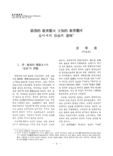

-
 * 본 문서는 배포용으로 복사 및 편집이 불가합니다.
* 본 문서는 배포용으로 복사 및 편집이 불가합니다.
미리보기
서지정보
· 발행기관 : 한국교육학회
· 수록지 정보 : 교육학연구 / 20권 / 2호
· 저자명 : 姜榮惠
목차
Ⅰ. 序 : 敎育的 價値로서의 “自由”의 問題
Ⅱ. 浪漫的 敎育觀과 自由의 意味
Ⅲ. 主知的 敎育觀과 自由의 意味
Ⅳ. 論議 및 結論
參考文獻
Abstract영어초록
Ⅰ
From the ancient times to the present age, to foster a freeman has been universally regarded as an educational ideal. In the modern democratic society, especially, the concept of freedom represents one of the prime principles presiding over liberal democratic societies. But the meaning of freedom as an educational value has varied with different ages and societies. In some circles, education is conceived to be the development of mind, which is assumed to be of a freeman. However, the concept of mind accounted for in the context of education is understood in various ways by different theoretical thinkers.
This study is an attempt to clarify the nature or meaning of freedom as an educational value, from the perspectives of two dominant lines of educational ideas developed in modern societies, i.e., the Romanticism and the Intellectualism. The Romanticism may be said to be a counter movement against the traditional education, whereas the Intellectualism is a modern version of the traditional conception of education, a legacy of the ancient Greco-Roman society.
Ⅱ
Romanticism as a type of educational view has grown out of roughly three different origins, namely the naturalism of Rousseau, existentialistic interpretation of education and Freudian psychology.
According to Rousseau, the man is born free and good by his own nature; the child grows according to the natural laws and embodies his potentiality and endowments, if he is freed from social restrictions and deliberate interruptions. On the other hand, the romantists under the influence of existentialism and Freudian Psychology-often called “humanistic romantists-value the child's self-awareness and inner freedom. Romantists in general conceive education to be of emboidiment of the natural goodness and inner potentiality. According to them, education aims ultimately at one's self-realization. Critics of this view often mention that they devaluate the socio-cultural character of the human mind. Romantists are criticized in that they understand the individual as one antagonistically against the society, and that the individual's freedom may be attained when he lives away from social controls.
It may be said, however, that the Romantic view has drawn educators' attention to the inner character of the child. It prompted child studies from the late 19th century, and accelerated the development of scientific approach to education.
Intellectualism has originated from the ancient liberal education, namely of the Greco-Roman societies. They in the ancient times understood the human mind to be a separate entity from the body. The major function of education is to free the mind (or soul), that is, a conception of liberal education was prevailed a mong them. But the modern version of intellectualism, a typical form of which may found in theories of R.S. Peters and P.H. Hirst, account for education as an act of initiation into the cultural heritage or forms of knowledge. Peters hesitates to be committed to the romantic view of child-centered education. He believes that freedom as a concept of educational value is to be understood as a social principle. Thus, the child's conception of freedom may be expected to be cultivated in the social situations where teachers or adults play an active role as an already initiated member of the society. The child's autonomy way develops as he learns rules and reason in the choice of actions and ways of decision, etc. in our social life with a form of cultural tradition. The concept of autonomy entails rational reflection as well as authenticity.
Intellectualism seems to be sound and valid when it seeks the meaning of freedom in the socio-cultural life, if we consider education as a social enterprise. But unfortunately, the Intellectualists have paid little attention to methodic principles for the child to be educated and autonomous.
Ⅲ
Generally speaking, Romantists stress the method of education, while Intellectualists are interested in its content primarily. But it seems not to be the case that content is one thing and method is another thing. When Peters denies that the achievement aspect of education can be validly carried over to its task aspect, he just makes a mere logical claim which does not endorce any empirical condition. The principle of freedom is of concrete actions which take place in our ordinary life. It cannot be apart from the daily experience of autonomous execution. A free man lives in the society with his own nature which may be admittedly to be identified by empirical studies.참고자료
· 없음태그
-
자료후기
Ai 리뷰판매자가 제공한 자료는 체계적인 구성으로 되어 있어 복잡한 내용을 과제에 쉽게 활용 할 수 있었습니다. 앞으로도 이러한 좋은 자료들이 많이 등록되기를 기대합니다. -
자주묻는질문의 답변을 확인해 주세요

꼭 알아주세요
-
본 학술논문은 (주)학지사와 각 학회간에 저작권계약이 체결된 것으로 AgentSoft가 제공 하고 있습니다.
본 저작물을 불법적으로 이용시는 법적인 제재가 가해질 수 있습니다. -
해피캠퍼스는 구매자와 판매자 모두가 만족하는 서비스가 되도록 노력하고 있으며, 아래의 4가지 자료환불 조건을 꼭 확인해주시기 바랍니다.
파일오류 중복자료 저작권 없음 설명과 실제 내용 불일치 파일의 다운로드가 제대로 되지 않거나 파일형식에 맞는 프로그램으로 정상 작동하지 않는 경우 다른 자료와 70% 이상 내용이 일치하는 경우 (중복임을 확인할 수 있는 근거 필요함) 인터넷의 다른 사이트, 연구기관, 학교, 서적 등의 자료를 도용한 경우 자료의 설명과 실제 자료의 내용이 일치하지 않는 경우
“교육학연구”의 다른 논문도 확인해 보세요!
문서 초안을 생성해주는 EasyAI

